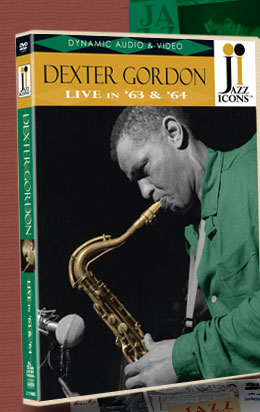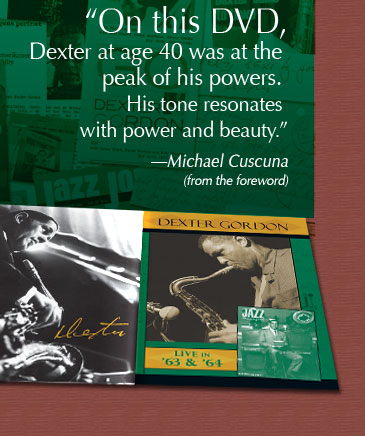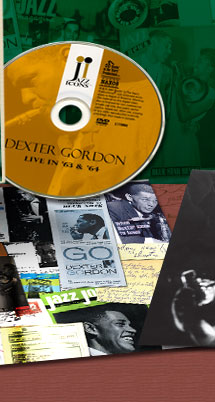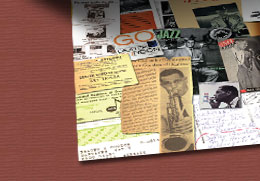




 |
 |
|
|||
|
|
|
||||
|
|
|
||||
|
|
|
||||
|
|
|
||||
 |
|
||||
 |
|
||||
 |
|
||||
|
|
|
|
|
|
|
Jazz Icons: Dexter Gordon features three concerts filmed in 1963 and 1964 in Holland, Switzerland and Belgium that highlight the bebop legend's classic style and silky tone. Filmed while Dexter was living in Europe, these shows feature legendary side musicians such as Art Taylor (drums) and Kenny Drew (piano) and jazz classics "Blues Walk", "A Night In Tunisia", "Body And Soul" and others. One of the most influential saxophonists in jazz history (both John Coltrane and Sonny Rollins claim him as an influence), Dexter Gordon is captured in sharp form and style on this 70-minute tour de force. |
|
 |
|
|
Dexter Gordon (Tenor Sax) George Gruntz (Piano) Guy Pedersen (Bass) Daniel Humair (Drums) |
|
 |
|
|
Dexter Gordon (Tenor Sax) Kenny Drew (Piano) Gilbert “Bibi” Rovère (Bass) Art Taylor (Drums) |
|
 |
|
Dexter Gordon (Tenor Sax) George Gruntz (Piano) Guy Pedersen (Bass) Daniel Humair (Drums) |
|
|
|
|
|
Foreword: He was a one-of-a-kind in so many ways. Musicians are by trade citizens of the world, but I’ve never seen anyone quite as comfortable and acclimating as Dexter no matter where he was. He was also a voracious reader, favoring 19th-century French writers (he learned to read French while he was the librarian in Chino Prison where a patron had donated a collection of books in French) and contemporaries like J. P. Donleavy (The Ginger Man was one of his favorites). On the performances on this DVD, Dexter at age 40 was at the peak of his powers. His tone resonates with power and beauty, his chops enable him to execute whatever occurs to him and his ideas flow seamlessly. Lester Young once told him that it was essential to know the lyrics to a song to play it properly. Based on his ballad performances here, especially on “You’ve Changed,” it’s a lesson learned well. —Michael Cuscuna
Sample Liner Notes by Maxine Gordon: When the performances on this DVD were filmed in Europe in 1963 and 1964, Dexter Gordon was not on tour from the United States. He was living in Copenhagen, Denmark, working for months at a time at the Montmartre Jazz Club. At the time of the concert in Lugano, Switzerland, on September 20, 1963, Dexter was 40 years old and was referred to as an expatriate even though he never considered himself anything but a jazz musician living in Europe where he could find steady work and peace of mind. When he wasn’t working, he would often be seen riding around town on his bicycle. Though clearly attached to the United States —he made numerous trips back to visit his family—he considered Copenhagen his second home. ... Dutch TV, Amersfoort, Holland The “preferred” drummer, Daniel Humair, when asked to recall the days with Dexter, commented: “Dexter was the perfect jazz musician because the music was always about purity and creation. He never played the role of the leader, he never dictated, because he knew that this would have a negative effect on the musicians and would cancel the purpose of the mutual adventure. As a drummer, he was one of the most pleasing soloists to be behind. We never had an argument and he was devoid of an ego. His attitude was respect of musicians to musicians.” ... On this performance, Dexter plays “Second Balcony Jump”, which he had recorded in 1962 on the Blue Note album Go! The Billy Eckstine and Gerry Valentine composition certainly reminded him of those days that he considered his best, when he was playing in a band with Sarah Vaughan, Fats Navarro, Gene Ammons, Leo Parker and Art Blakey. He never tired of talking about the great Eckstine Band and all that he had learned from its musicians. He is also heard on the beautiful ballad, “You’ve Changed”, which he had recorded in 1961 on the Blue Note album, Doin’ Allright. He was certainly thinking about Billie Holiday when he played this tune. On both compositions, Dexter is able to stretch out and give plenty of solo space to his stellar sidemen. ... Jazz Prisma (Brussels, Belgium) The compositions played on this DVD were part of Dexter Gordon’s repertoire during this period when he was living in Europe. He played “Body and Soul”, “You’ve Changed”, “Second Balcony Jump”, “What’s New” and “Lady Bird” almost nightly—and re-worked them every time. (“Lady Bird” was written by Tadd Dameron. Called “the romanticist of the bebop movement” by Dexter, he also composed “If You Could See Me Now”, which became Sarah Vaughan’s first signature song.) The chance to hear and see these performances after listening to them on LPs and CDs makes us acutely aware of the ability of jazz musicians to interpret and re-interpret and then re-interpret again what we think of as a perfect performance. ... —Maxine Gordon All words and artwork on this page ©Reelin' In The Years Productions. Unauthorized use is prohibited.
|
|
Site contents ©Copyright 2007 Reelin' In The Years Productions
Site designed by Tom Gulotta